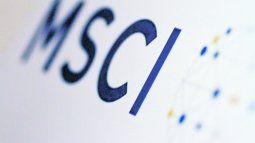In its market access review, MSCI considered that Argentina, which is in the “Standalone” category since 2021, does not meet the minimum liquidity requirements or that its markets are partially closed to foreign investors.
MSCI(Morgan Stanley Capital International)the global financial information firm elaborated by one of the most followed stock indices in the world, He held Argentina on Tuesday in the “Standalone” market category, Which means that the country It remains excluded from the indices composed of “border markets” and “emerging.” The decision, which was closely followed by the local market, dilutes the expectations generated by the recent flexibility of the stocks to the dollar last April.
The content you want to access is exclusive to subscribers.
Argentina remains in this category since 2021, when it was degraded after the hardening of the exchange rate and the obstacles to the access of foreign investors. In his “Market Accessibility Review”, MSCI said that the country still does not meet the minimum criteria in terms of liquidity, access to the market and regulatory framework, necessary conditions for an eventual status improvement.


Among the critical points, the report emphasizes that “There is no efficient offshore exchange market” and that, although in April the Central Bank raised some restrictions (such as allowing the repatriation of dividends obtained since January 2025), obstacles persist that They affect the operational investors abroad.
In addition, the qualifier stressed that the availability of corporate information in English is still limited, which threatens equal conditions for the analysis of local companies.
He also questioned state interventions that, according to the report, “They questioned the stability of a free market economy,” and warned about the lack of competition between brokers, high transaction costs and low access to stock instruments.
What does it mean to be “standalone” and what does it imply for the market
MSCI divides countries into three major categories: developed, emerging and border. Those who fail to meet the basic requirements in terms of liquidity, operational access and normative environment are classified as “standalone”, a kind of financial limbo. This is explained by Guardian Capital: “It is an elegant way to say that you are so particular that there is no one to compare.”
The impact of this classification is concrete: the funds that replicate indices such as the MSCI Emerging Markets or the MSCI Frontier Markets do not include actions from Standalone countries. In other words, there is less international exposure, lower income of institutional flows and a higher risk perception. This not only affects the Equity: it also leaves the country with less visibility against global banks and financial services providers that adjust their coverage based on these indices.
Outside msci, Argentina does appear as “emerging” in other rankings, such as the EMB of JP Morgan, focused in sovereign debt. However, for investors who follow variable income, MSCI’s gaze continues to be a must.
The annual review again shows that, beyond the change of government and the tour promoted in economic policy, external trust takes time to rebuild. And that structural reforms must go hand in hand with operational, regulatory and transparency improvements so that Argentina is again on the radar of the great global players.
Source: Ambito
I am a 24-year-old writer and journalist who has been working in the news industry for the past two years. I write primarily about market news, so if you’re looking for insights into what’s going on in the stock market or economic indicators, you’ve come to the right place. I also dabble in writing articles on lifestyle trends and pop culture news.




